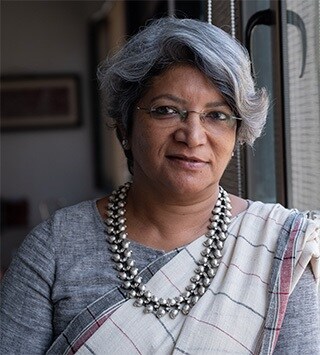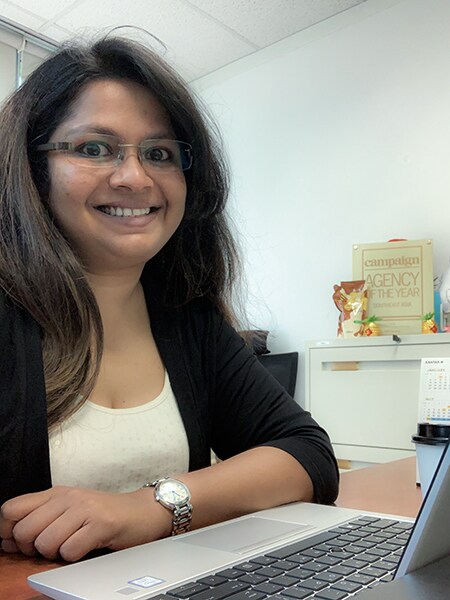
- Home
- UpFront
- Storyboard18
- Don't empower me. Pay me: How to fight for your worth and ask for more money
Don't empower me. Pay me: How to fight for your worth and ask for more money
From founders to CEOs to headhunters, women in leadership share their experiences and advice for other professionals who are still struggling to ask for their worth
 In the run-up to International Women's Day 2022, we invited women in leadership from the advertising and creative industries to tell us how they discovered their male counterparts were earning more, how they fought for fair pay, and their advice on how to ask for your worth.
In the run-up to International Women's Day 2022, we invited women in leadership from the advertising and creative industries to tell us how they discovered their male counterparts were earning more, how they fought for fair pay, and their advice on how to ask for your worth.
Image: Shutterstock
According to the World Economic Forum’s Global Gender Gap Report 2020, men and women will have pay equality in 257 years.
Related stories
Research from India’s leading diversity and inclusion consulting firm Avtar Group shows that women are paid 34 percent less than men for performing the same job with the same qualifications. This is across industries.
With International Women's Day just around the corner, these statistics made us recall firebrand entrepreneur and founder of Make Love Not Porn, Cindy Gallop’s famous words—“Don't empower me. Pay me".
So, in the run-up to IWD 2022, we invited women in leadership from the advertising and creative industries to tell us how they discovered their male counterparts were earning more, how they fought for fair pay, and their advice on how to ask for your worth.
‘Gender has no role to play in compensation’
 Meenakshi Menon, founder of Spatial Access (which is now a Deloitte business) shares how she learned the most important professional lesson.
Meenakshi Menon, founder of Spatial Access (which is now a Deloitte business) shares how she learned the most important professional lesson.
My experience
It was mid-1988. I had just been promoted to DGM at Lintas even though I had just taken a month off to have a baby. Life was perfect. I had an amazing boss, Atul Sharma, who was supportive and yet ran an extremely tight ship. My team was terrific, the best one could ask for. I worked in an agency that was very supportive of women. My super boss Alyque Padamsee (AP) was an equality man. My baby girl was doing well and I was enjoying the whole experience of being a young mother. It was the perfect blend of professional and personal life being balanced and fulfilling. Then my perfect world came crashing down.
How this happened needs a bit of a back story.
I was one of the handfuls of authorised bank signatories in Lintas. A senior accountant would come up to the 15th floor for signatures. The protocol was that as long as the expenses were approved by the finance manager, on the cover sheet, you could blindly sign the documents. The accountant who came with the papers always ensured that the cover letter obscured the details—particularly when it came to staff salaries. One day, when the accountant came with the papers for my signature, he was called by AP. Now everyone in Lintas knew when AP called, you dropped everything and ran. More so the poor accountant who quivered at the sound of “Mr Padamsee wants you”.
The papers were on my table and there was no sign of the accountant. Just a few months earlier, a new DGM had joined the company. This was someone I liked and gelled with. I had heard on the grapevine that he had been poached from another agency at a premium. We were at the same level, with roughly the same work experience. Curiosity got the better of me, so I peaked at the details. His package was 35 percent higher than mine.
At the same level, I could have accepted a slight difference given that he was recruited from the outside whereas I had by then spent almost seven years with the company. A 10 or 20 percent premium for fresh meat used to be an accepted norm. This 35 percent difference was not something I could stomach. I immediately knew it was the gender gap rearing its ugly head. Unbelievable that it was Lintas. Within minutes I stormed into AP’s cabin and I was livid. I have never felt so rotten about being a woman. It was clear to me that any sign of weakness would have been exploited by the organisation. More so since I just had a baby and was living in a company flat. It was a make or break situation and I was not about to blink. That was the first and last time I experienced this.
I renegotiated my package to what I thought was an acceptable difference. The poor accountant got an earful from all his seniors in finance for leaving the papers unattended, but I was happy.
My advice to you
Women in the workplace are to always make the effort to find out if they are being treated unfairly. If you are, then put in the effort to right that wrong. If you don’t consider yourself worth the fight, why should someone else?
It is absolutely wrong to suffer in silence because then you end up being a silent facilitator of this indignity. Raise the issue, say, "I know you are treating me unfairly and I may choose to stay back till it suits me." As we climb up the corporate ladder, we must ensure pay parity in our companies and organisations. I can say with justifiable pride that in every company I worked in after Lintas, I made sure that this was a non-negotiable management principle. Gender has no role to play in compensation. It was only all about ability.
‘Pay it forward’
 Anisha Iyer, CEO, OMD India, says while negotiating, it’s 'prudent to stick to facts and not over-personalise one’s reality'.
Anisha Iyer, CEO, OMD India, says while negotiating, it’s 'prudent to stick to facts and not over-personalise one’s reality'.
My experience
Disparities in pay are woven deep in the work culture. We now function in a competitive world that mandates additional responsibilities, especially since the pandemic. Through my journey over the decade, I have realised that a systematic departure is required to make this a question of meritocracy versus mediocrity instead of man versus woman.
Irrespective of gender, it is essential to own the talent. When one walks into the room, their professionalism should be determined by their performance. This discourse is getting more attention every day because advertising as an industry itself is witnessing progressive change as consumer demand is shifting. There is no reason to not start changing the norm in-house as well by making room for dialogues that matter.
The best advice I got
A wise ex-boss once gave me a bit of advice I have held close to my heart. Pay it forward. On the career path, we are likely to come across people in a situation we have been in and this is our moment to handhold them. This is the only way empathy and inclusion become genuine in organisational culture. That is what leadership is about.
My advice to you
It is prudent to stick to facts and not over-personalise one’s reality. The value any professional brings to the table should be apparent and if not, one needs to cultivate the attitude to address perception gaps by standing up for oneself. As humans, we all have troubles we are trying to navigate daily. But the art of balancing problems and opportunities is critical. Self-victimisation does not lead to growth. Nor does voicelessness. We must learn to speak up, negotiate smartly and be irrefutable in facts that substantiate our performance. Age, gender, race and even experience cannot define one’s capability. Having said that, one should always seek clarity about what a role demands in terms of delivery and assess fitment accordingly. If it calls for a pay hike, ask for it, irrespective of what gender one is.
‘Be your own cheerleader’
 Pooja Jauhari, CEO of The Glitch, shares her tips on how to 'command it and not demand it'.
Pooja Jauhari, CEO of The Glitch, shares her tips on how to 'command it and not demand it'.
My experience
In my experience, I truly understood gender pay disparity when I was a mid-level executive. Until then, I was still figuring out this complex idea of “what’s my real goal?” I vividly remember getting an offer letter and being completely shocked at my compensation just to have my bubble burst a few months later when I learned of my male counterpart’s salary. It started with anger, then an outburst in front of my boss, and tears. I am happy to report that I have grown since then. The result of my meltdown, however, was that it lacked strategy, data, and creative execution.
My advice to you
I’ve learned to be very clear about the outcome I want from the discussion. This is simple, I want to be paid a certain amount not because I am a woman who needs to be given equal pay. But because I am fantastic at my job with a proven track record.
We need to be able to be unapologetically clear about our own worth. If we can’t be our own cheerleaders, there is no way we will have others cheering for us. So, take gender out of the equation and focus on your own capability.
Understand the data. Why is someone being paid more than you? Understand that and work towards using that in your favour. Years of experience, skill set are often words used to state a reason for lower compensation. To me, that’s bulls**t.
If a 30-year-old does the job of a 50-year-old, you must still pay them fairly. So, command it and not demand it. Upskill yourself and prove why you are worth—without any delusions of grandeur. Experience is important. If you don’t have that how will you make up for it? RTB is key and you will have to learn to package your skillset for it to work in your favour.
Lastly, remove the emotion from the discussion. This is a negotiation! Not a conversation with a family member or friend. Approach it like you would approach any transactional conversation, so no one can dilute this discussion for you in the process.
Top tip
Be strategic, gather data and approach it like a transaction.
‘The collective voice gives strength to the individual voice’
 Rita Verma, EVP and head – HR, DDB Mudra Group shares advice from a headhunter’s perspective.
Rita Verma, EVP and head – HR, DDB Mudra Group shares advice from a headhunter’s perspective.
My experience
The experience of being the only woman in the corporate decision-making room is a very familiar one for me—and unlike Oprah Winfrey, I have to admit that I haven’t always loved it. To be absolutely true, initially, it was actually quite intimidating. Over time, of course, there was pride, a responsibility to work towards bringing in more women into important conversations, and a realisation that I had the influence to make that happen.
In that journey, I have more often been on the other side of the table as a talent head, where I have observed how men and women ask what they believe they deserve—be it roles, positions, or fair pay.
Having worked for 22 years, I have always believed that rewards should be asked based on your role and achievements.
Definitely, there used to be a difference in how men and women were evaluated for roles and promotions even five years ago.
Somehow, a woman’s personal life would always be brought up in conversations, while that did not seem to matter in the case of men.
Even today, I find ‘readiness’ for a role or a position being considered more for women. If men display confidence, they are considered ready. However, it has been heartening to see women starting to realise their own worth and value. That is what gives them the confidence to ask for what they deserve. There is still hesitation, diffidence, and I am sure a lot of anxiety when women choose to do it, but I definitely see it happening.
During our Phyllis India conversations (Phyllis India is DDB Mudra Group’s women’s leadership program), this subject of negotiating for what you are worth has come up repeatedly. And we have seen our talent derive courage from the inspiring speakers, and their peers, to be more objective about their capability and worth. The asking for it comes next. The collective voice gives strength to the individual voice for sure.
My advice to you
Recently I came across this lovely quote of Janet Foutty, executive chair of the Board at Deloitte US—“Be fearless. Know how good you are, and then know that you are at least 50 percent better than you think you are.”
'Because you are worth it'

Malini Agarwal, founder & creative director MissMalini Entertainment, Girl Tribe & Co-Founder of Good Creator Co, says if you don’t ask for what you’re worth you may not always find people that choose to recognise it.
My experience
Looking back, I have had a pretty interesting experience with the pay gap.
At my first job back in 2000, I was paid Rs 5000 for doing a job I can easily say was worth 3 times that even back in that year. I know this because, after about three months, I was offered a similar role for Rs 18,000. I took the job, but then my former employer promptly hired me back when a project I had been working on came through—and there was no one else at the company who could fill my role immediately.
Of course, I demanded that he not only match the salary but add on another Rs 1000 for good measure. (To be honest, I don’t know for sure if all this happened because I am a woman, or my employer was just cheap!)
Many years later, when I became an RJ, I had a salary of about Rs 40,000 at a local radio station. As per our KPIs, we would get a certain percentage of raise each year. I took that as standard practice and never thought to challenge it even after working there for four years.
One day chatting with a colleague in the hallway, I discovered that another male RJ—who had joined about six months ago—had demanded three times his salary and gotten it overnight. I was shocked! I didn’t know that was something people did and I certainly didn’t see myself “demanding” anything from anyone.
Now I wonder if my naiveté came from ignorance about how the world works or the fear of asking for something that I may well deserve but hadn’t ever been offered.
So guess what I did? I went up to the boss' office the next day and told him that someone told me, given my skills and experience (and damn was I good RJ!) I should demand three times the amount of my salary, so given the slow pace at which things were going, I would, unfortunately, be leaving.
To which he immediately said, “No problem! We’ll match that right away.”
My advice to you
That day, as I closed the door behind me, feeling slightly guilty about having tweaked the truth a little to my advantage, I realised that if you don’t ask for what you’re worth, you may not always find people that choose to recognise it until you do—ask and you shall receive.
Now, as a boss myself, I try my best to give credit where it’s due and assign value accordingly. I am proud to say most of our top management comprises women. Even though that is not by design, we have always been proud that it turned out that way!







